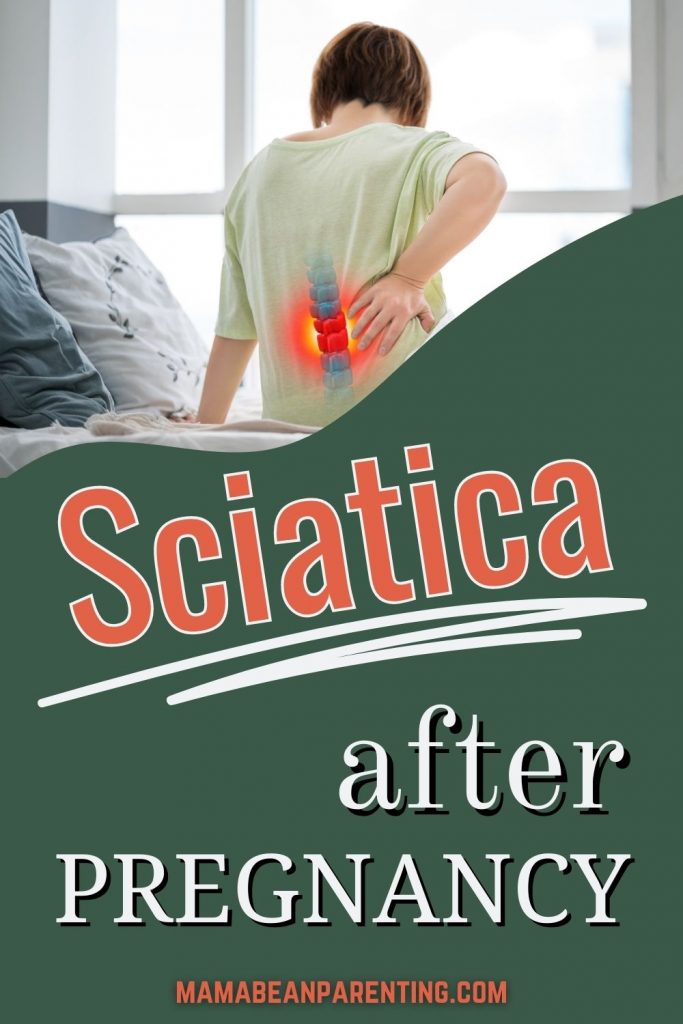Sciatica after pregnancy or sciatic nerve pain is one of the most difficult pregnancy complications.
Many women experience sciatica during pregnancy, but when this condition persists even after you give birth, it can be very challenging and difficult to deal with.
Luckily, there are some things you can do to make everything easier. It’s hard when you’re in pain while having a newborn baby at home.
You want to take care of your little one, but you’re tired and anxious because you can’t stand sciatica after pregnancy.
Pregnancy is a period when everything changes, and sometimes those changes can be negative. Sometimes they stay with us for a long time and they’re hard to reverse.
This article will help you learn more about sciatica after pregnancy and treatment methods. When you know what’s happening and what to do, everything is easier.
Your mind is more peaceful and determined. You know your goal and your mental health is on the right track.
Physical pain can affect your mindset, so being informed about your condition and having a plan will certainly help you to stay calm and focused.
After all, when you have the willpower to fight against the things that are bringing you down, you are destined for success.
What Is Sciatica?

Before we start to explain postpartum sciatica, it’s good to know what sciatica is. This condition can happen to anyone, not just pregnant women, or new moms.
Sciatica is nerve pain caused by damage, injury, or irritation of the sciatic nerve. The sciatic nerve is localized in your gluteal area and it goes through your leg.
Sciatic nerve pain is mostly characterized by leg pain or back pain. Many people are struggling with sciatica because this nerve is easily irritated, pinched, or inflamed, inline other nerves.
The sciatic nerve is the longest and thickest nerve in our bodies. This explains why sciatica is so painful and uncomfortable. Being in pain and sciatic nerve problems usually go together.
There are many things that cause sciatica, and sometimes this condition happens for no special reason.
Discus Hernia Or Slipped Disc
When it comes to the anatomy of your spine, it’s important to know that your vertebras are cushioned with discs. Those discs are very important, but sometimes they “fall out” or protrude from their original place.
That condition is called discus hernia. Discus hernia is quite painful and it can create pressure on your whole spine and nerves.
That being said, sciatica can happen because of the pressure caused by discus hernia.
It’s important to remember that other conditions connected to spinal injuries and syndromes can cause sciatic nerve pain.
Arthritis
Arthritis and other similar condition can be the cause of nerve and back pain. Your muscles and bones are simply weaker due to arthritis and sciatica is quite common if you have this condition.
Obesity
Being obese can cause sciatica. As a matter of fact, you don’t have to be obese, you could only have a few extra pounds to suffer from sciatica.
Sometimes your core isn’t strong enough to deal with any extra weight, and your sciatic nerve pain happens.
Muscle Weakness
Your abdominal and spinal muscles are your core muscles. When your core is weak, you could get sciatica. Sometimes you could be skinny and active, but when your core muscles are weak, sciatica is inevitable.
Physical Labor
If you’re someone who has a physical job or simply goes through a lot of physical labor, your body will suffer.
Frequent back pain, discus hernia, sciatica, and other condition are common if you’re lifting and carrying a lot of heavy things.
Diabetes
People who suffer from diabetes, are more prone to nerve damage, including the sciatic nerve.
Trauma
It’s possible to get sciatica after a car accident or some other trauma to the spine and nerves.
Epidural
Many women get epidural anesthesia for easier labor and delivery. However, epidural has its side effects. One of those side effects is nerve irritation or even damage.
This happens rarely, but it’s not impossible.
If you had an epidural, it’s possible that it caused postpartum sciatica. Make sure to consult with your doctor and figure out a treatment plan.
In many cases, epidural side effects go away on their own after some time. In rare cases, women are left with permanent nerve damage.
Pregnancy
After you’ve read all these common reasons that cause sciatica, it’s pretty logical that pregnancy can cause this condition too.
Women carry extra weight during pregnancy, and it’s normal to have back pain, joint pains, and muscle aches.
Sciatica during pregnancy is something usual, but it usually goes away after you give birth.
Another major reason for sciatica during pregnancy is hormonal changes. Hormones work on loosening your ligaments and that’s another reason that causes a weaker core.
So, a weaker core, weaker muscles and ligaments, pregnancy weight, and pressure are reasons for pregnancy sciatica.
When you give birth, you get rid of the extra weight, your hormones slowly go back to their normal state, and your sciatica pain usually goes away.
However, some pregnancy changes are temporary, but some of them can last a long time.
Symptoms Of Sciatica

Symptoms of sciatica can often be mistaken for something else. This condition is characterized by quite general symptoms like:
- Muscle weakness
- Leg pain
- Lower pain in the back
- Problems with movements, walking, or bending
- Poor reflexes
- Numbness
- Tingling in pelvic floor area
All these symptoms can mean many different things. Some women think it’s connected to their weak legs, and others think that it’s just sore back.
It can be even more difficult to diagnose pregnancy sciatica or postpartum sciatica. Most new moms and pregnant women are going through a lot with their bodies, and it can be hard to recognize the right symptoms.
The doctor should a physical exam, and run some tests like X-ray, MRI, or CT scan. Of course, if you’re pregnant X-ray is not an option.
In many cases, when a doctor diagnoses pregnancy sciatica, you will be told to stay cautious and take care, because everything should be fine after delivery.
You should always listen to your doctor, but there is nothing wrong with asking for a second opinion and trying some tips and tricks to ease the pain.
If you take care of pregnancy sciatica, you might avoid postpartum sciatica. Don’t take this condition lightly, even if it’s so common.
Sciatica After Pregnancy

Now that you know more about sciatic nerve pain, I’m sure you’re not surprised you’re struggling with this condition after pregnancy.
The first thing to remember is that if you recently had a baby and you’re experiencing sciatica, you should be patient.
It takes time for everything to go back to its original place. It takes time for your body to recover, so don’t panic before it’s time to do it.
If it’s been a while since you gave birth, and you’re still experiencing sciatica, it’s time to do something about it. As I’ve mentioned, most women who experience postpartum sciatic nerve pain, also had problems with pregnancy sciatica.
If you’re pregnant and reading this article because you have sciatica and you’re worried that it won’t go away after delivery, it’s time to do something about it.
Find a professional who will take your problems seriously and help you to solve them. Another thing to do is take a pregnancy workout class because exercise can help a lot with this condition.
Massage is also great for reducing pain and improving blood flow. It’s even better if you find a professional who knows how to massage a person with sciatica.
If you’re a new mom who’s reading this article because you have postpartum sciatica, don’t worry, there is still hope.
In some rare cases, sciatica can appear after delivery. That means that some women didn’t have sciatic nerve pain during pregnancy. Delivery is tough, and your body goes through a lot.
It’s possible that your problems with the sciatic nerve started while you were giving birth.
If you had pregnancy sciatica, it’s also possible that all the pushing and straining during delivery caused some kind of damage that will worsen your sciatica.
Back injuries and spinal traumas can have a negative effect on sciatica nerve pain.
In the end, it doesn’t really matter why you’re going through this and was there something you could’ve done about it.
Now you have to focus on getting better. Treating sciatica after pregnancy is not just about getting rid of the pain and other mobility issues.
If your sciatica becomes chronic, it could cause other health problems too.
So, let’s see what can you do about it.
How To Deal With Postpartum Sciatica?

Learning about sciatica in general is important for understanding this condition completely. When you’re aware of all these things I’ve mentioned above, you will create a better plan to fight this condition.
As I’ve said, give it some time if you just gave birth, and do your best to stay healthy and keep moving.
Don’t do any heavy lifting, and be careful when you’re moving. I know that you’re thinking about doing household work, but be patient and gentle with yourself.
When you recover, and all those annoying postpartum things are gone, but your sciatica is still there, it’s time to level up.
First of all, find a good doctor.
Find someone who is a professional in this area and someone who will do some tests to see if it’s only sciatica, or if something else was damaged during delivery that is causing sciatica.
Choose a doctor who will take care of you and someone who won’t neglect you. Sciatica is treatable, but you have to make an effort and you have to be disciplined.
Therefore, you need a health professional who will take you seriously.
The reason I’m talking so much about this is because many of my friends are suffering from sciatica for years, just because no one took them seriously.
Yes, sciatica is normal during these challenging times in a woman’s life, but that doesn’t mean it’s not important.
That doesn’t mean you should just leave it alone, and be sloppy about it. You have to take this seriously, and you need someone who will guide you to your recovery.
When you find a good doctor, you will probably find many recommendations from him or her that will help you on your way to recovery. If your pain is severe, you will get some suitable painkillers.
Make sure to tell your doctor if you’re breastfeeding.
Besides a physical exam, diagnostic imaging techniques, and medications, it’s also important to do your exercises.
Your body can heal itself in many cases, but you have to help it. Many doctors have books, flyers, videos, or images that will help you to do the right exercises.
The doctor will show you everything and you shouldn’t be afraid to ask anything. It’s better to be sure than to do some exercise the wrong way and end up hurting yourself.
If you want to be even more serious about solving your sciatica, you need physiotherapy. Don’t be shy to ask your doctor to give the recommendation to see a physiotherapist.
Physical therapy will help you with exercises, but there are other amazing things that will be even more helpful.
Professional massages, hydrotherapy (water exercises), electrical nerve stimulation, and ultrasound therapy can do wonders for nerve pain.
Additionally, a physiotherapist will teach you many valuable things about your body, your condition, and your routine.
Besides these things, it’s also important to be determined and disciplined at home. You can find great doctors, but you won’t spend your whole day with them.
Following their advice and staying careful is essential while going through this painful condition. You can also do the exercises your physiotherapist suggested at the time.
Of course, don’t overdo them.
Gentle massage at home, warm compresses, and warm showers are also quite helpful when you’re at home.
Try using baby oil when massaging. It makes a difference and it hydrates your skin.
If you don’t have a professional to help you, you can definitely try to do things on your own in the beginning. There are many videos and tutorials that will show you some amazing exercises for sciatic pain.
As I’ve said, massage and warmness are also your best friends.
However, if you don’t see some positive changes in the first couple of weeks, please visit a doctor. There might be something else that’s causing this condition.
Another important part of your recovery is your diet.
Doing exercise, being careful when doing something around the house, and seeing a doctor are inevitable for you at this moment, but a good diet is also beneficial.
Try to eat healthy food, and drink a lot of water. A lot of healthy foods have anti-inflammatory effects and they can help with pain and recovery.
It’s also crucial to sleep enough.
I know that’s hard to do when you have a baby in your house, but as someone to help you for a while. Your body needs sleep to heal, and your sciatica needs you to heal as soon as possible.
Finally, if you want to recover from sciatica after pregnancy, you have to make it a priority. That includes focusing on postpartum recovery.
Taking care of your body, eating well, and giving your body what it needs will speed up your recovery
If you feel weak, and you need something to boost your energy and motivate you to do sciatica exercises, think about protein powders or some supplements like collagen or magnesium.
Body Armor is also useful when you need something that will lift you up.
One thing to remember is that sciatica has its good and bad days. It can also go away on its own, and it can be hard to get rid of.
I’m sure that this exhausting condition will go away, but it might come back. To prevent that, keep doing your exercises and become stronger.
Work on your core strength and mobility, and you will avoid sciatica comeback. This condition can happen to anyone, at any age, and now that you know how it feels like, I’m sure you want to put an end to it for good.
Staying Mentally Strong

A woman’s body is flooded with hormones during pregnancy and the postpartum period. When something is not so great, you feel even more overwhelmed and confused.
Being in pain can be very stressful. It takes a lot of mental strength and motivation to keep up with everything. Pain from sciatica can affect your mood and energy.
It takes a lot of discipline to take care of your baby and yourself even though you’re in so much pain. It’s hard to find something inside you that will help you fight this condition.
Just like every other condition, sciatica can also be more or less painful.
It can be consistent, and it can be something that comes and goes.
As a new mom, you’re tired without this condition. Feeling physically inadequate to take care of your child can have a negative effect on your self-esteem and attitude.
For this reason, I want you to be strong and remind yourself that giving up is not an option. I don’t care what it takes, you have to fight and you have to win.
Some people might think that sciatica nerve pain is not such a serious condition that could alter your life too much. They’re wrong.
This condition is not easy for anybody, especially for a new mom.
So, with all these tips and tricks on how to recover, you have to work on building your mental energy and positive attitude.
You have to find motivation even when your pain is excruciating. You have to keep fighting even when you don’t see progress.
Just imagine that your little one will be walking and running soon. You want to be there to experience that with your child. You don’t want to be limited.
Work on your body and work on your mind. Take control and pay attention to everything that you feel – both mental and physical.
Conclusion

Sciatica after pregnancy is not a pleasant condition and it can be very frustrating to deal with. This condition can be serious and it can be related to some other more severe conditions.
However, in most cases, postpartum sciatica is easily resolved with a little bit of patience, hard work, determination, and discipline.
Being a woman means experiencing motherhood. Becoming a mom is not an easy journey, and sometimes it has consequences.
Staying calm and keeping your composure in a difficult situation is your key to success. Every problem has a solution.
To find a solution you have to be concentrated and dedicated. Don’t be sad because you’re going through this. It would be great if everything was fine, but these things happen.
Don’t be lazy and take care of yourself properly.
You’re too young to be in pain all the time, and your baby needs you. Don’t take your health for granted and don’t postpone taking care of yourself.
Find good treatment options that will give you pain relief.
Conditions like sciatica are treatable, and you have to do everything in your power to change your situation.
Hi all, I am Sidney, an accountant, a hobbyist photographer, and a mother to two sweet girls who are my motivation. I love sharing the tips and tricks I gained all these years I’ve been a mother. I hope it will help you!


